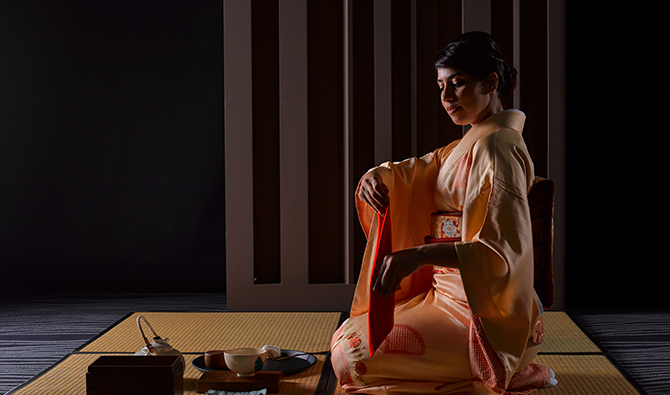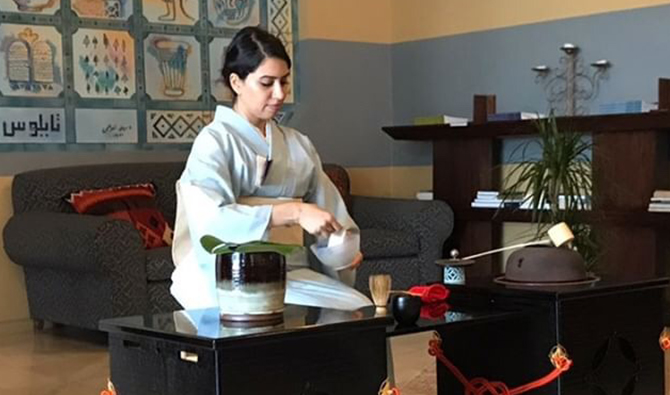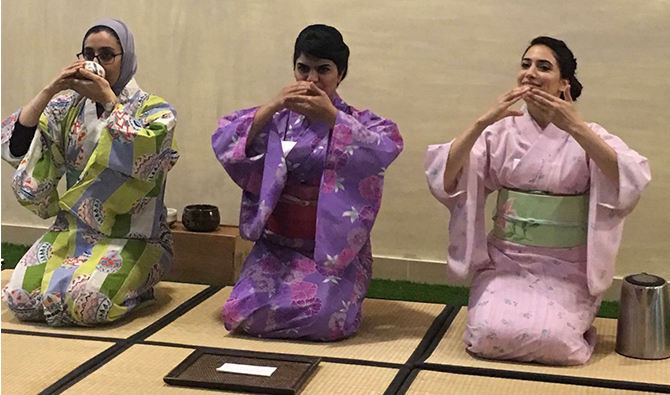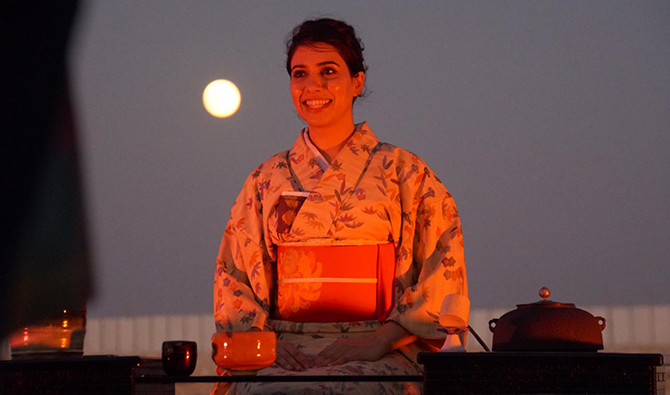







Ehtesham Shahid
Budoor Steele’s fascination with Japan started with her first cup of matcha (green tea) in 2008. “I was an English teacher at the time when one of my Japanese students invited me over for a traditional tea ceremony known as chadō茶道,” she said.
The invitation changed Steele’s life, and she became determined to share the experience with people in the Middle East.
“I dedicated my time and energy toward accomplishing this goal,” said Steele, who grew up in Bahrain and was pursuing her higher studies at Kyushu University.
The many lessons that she learnt during her stay in Japan not only shaped her personality, but also developed a worldview very different from what she had imagined.
She said she learnt to appreciate the little things that people often take for granted, and more importantly, “to be mindful of our surroundings, and to love what we do and utilize all the time we have to learn and grow.”
What makes the Japanese tea tradition so unique to a student who chances upon it? Chadō “translates to ‘the way of tea.’ It’s a way of life,” said Steele, adding that it is based on four main principles: Wa和 (harmony), kei 敬、(respect), sei清 (purity) and jaku寂 (tranquility).
“Chadō is a practice that builds character. It teaches us to be respectful, humble and patient. It serves as a form of moving meditation that allows us to take a step out of this world and into a realm of peace, surrounded by nature and simplicity,” she said, adding that it is much more than just consuming a beverage.
“As you step into the tearoom, you imagine being in a world where nothing from the mundane life exists inside of that realm.”
Steele wanted to learn more about Japanese culture, and being a foreigner advocating it, she knew she had to be knowledgeable about every detail in terms of historical and traditional content.
Once fully aware of all this and accomplished in the art of tea mastery, she was raring to go and chose her birthplace Bahrain to spread her wings as an entrepreneur.
Her labor of love was a first-of-its-kind Japanese teahouse called Chawan茶椀, which opened in 2012.
“I chose Bahrain because I’m Bahraini, and I wanted people in the Middle East to experience what I did in Japan starting with Bahrain,” she said, even though the learning was not yet complete.
“When I first opened Chawan I wore a yukata (Japanese summer kimono) every day, and one day a Japanese visitor pointed out that my yukata was tied incorrectly,” Steele said. This was a wakeup call for her as she did not want to misrepresent the culture.
When she returned to Japan in 2015 to do a master’s degree in Japanese humanities, she was determined to spend all the time she had investing in herself.
“I attended kimono school for two years after university classes ended, and got certified in professional kimono dressing,” she said, adding that now she is “able to dress and teach Japanese people the proper ways to wear a kimono.”
And on weekends, she took a two-hour bus ride from Fukuoka to Sasebo to continue learning chadō.
She expressed gratitude to her kimono teacher Honda Sensei and her chadō teacher Ōishi Sensei for their dedication and patience in teaching her.
“I also want to thank my host mother Yoshida San for giving me a home during my weekend stays in Sasebo and supporting my passion,” Steele said.
“Operating a tea shop that educates about Japanese culture wouldn’t be as successful without a deep understanding of the historical and traditional context.”
Since then, Steele has been performing tea ceremonies on various occasions to educate Bahrainis about the beauty of chadō, Japanese culture and the benefits of tea.
“Since my return to Bahrain, I hosted many tea gatherings to celebrate various Japanese events, such as the Tanabata star festival in July and the moon-viewing Tsukim tea gathering in September to celebrate the harvest moon,” she said.
Steele maintains that Japanese green tea is different from other teas in terms of process. It is “usually steamed instead of pan-fried or fermented, which gives it the distinctive grassy, fresh and vegetal notes,” she said.
The tea-ceremony process is based on specific movements and gestures that reflect a moving meditation.
“Being in the tearoom is meant to give you a sense of detachment from the world. Everything is built specifically around this idea, from the moment you enter the tea gardens to the moment you step inside the tearoom,” she said.
That is what makes chadō practice therapeutic, she added. “The matcha served during the ceremony is also full of antioxidants and theanine, which calms the brain and de-stresses the nerves naturally.”
It makes sense to elicit Budoor’s views on the tea tradition followed by the Arabs, who, according to her, have always appreciated a sugary cup of red tea, sometimes with mint or milk.
“The tea culture in the Middle East however, lacks proper knowledge about basic tea brewing techniques and infusion,” she says adding that although tea knowledge is slowly becoming popular, we still have a long way to go.
“I believe that in time, people in the Middle East will start to appreciate good quality loose leaf tea just as they now do coffee. I am determined to spread the tea culture knowledge and educate until we get there,” Budoor says.